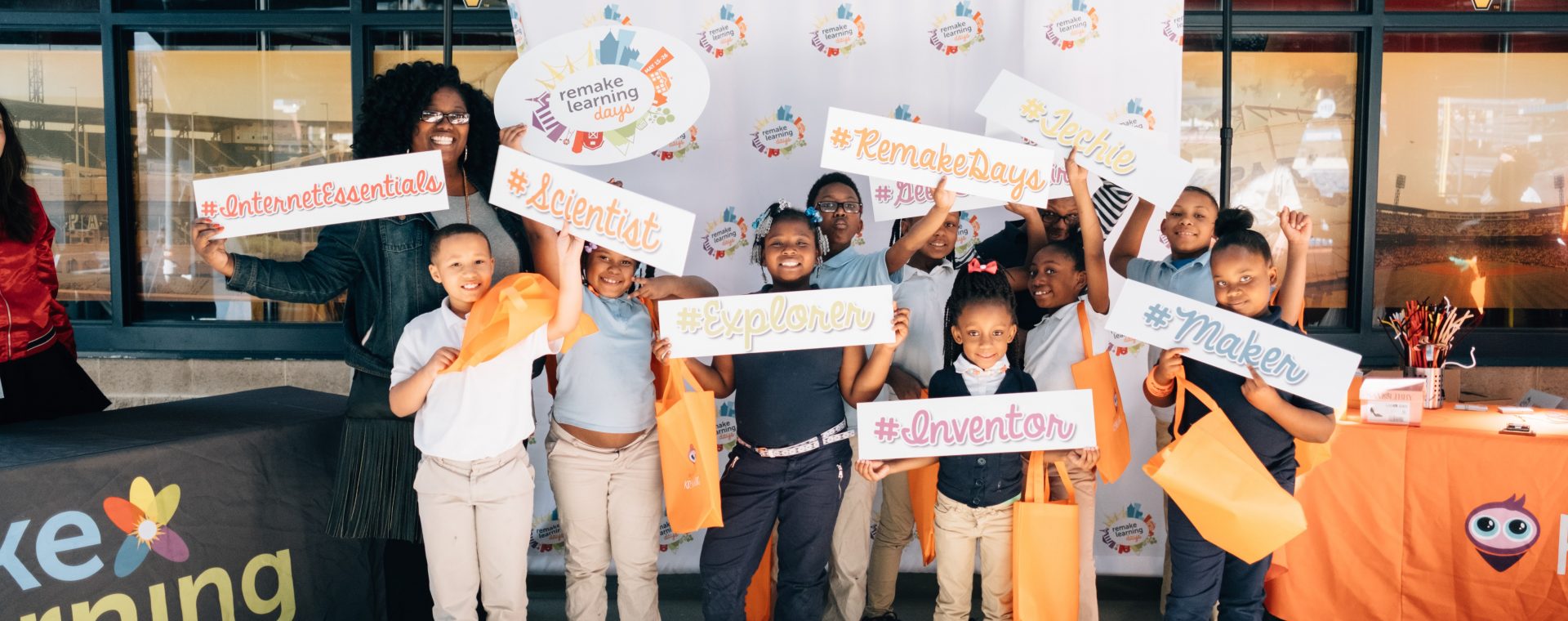
In 2019, when Remake Learning Days Across America was coming to Prestonburg, Kentucky, the festival’s organizers began approaching local small businesses. They wondered: Would they consider hosting hands-on learning events in their offices and stores?
The owner of a small sewing shop was hesitant at first. She had never considered that her modest storefront could play a role in her region’s learning ecosystem.
But the festival’s organizers persisted, finally convincing the store owner to host a sewing class. On a Saturday morning that spring, seven children arrived — each accompanied by a parent or grandparent.
What followed surprised all of the adults involved. Children bonded with their parents and grandparents over stories about the cultural tradition of quilting in their communities — something they had known little about. They also discovered that sewing involves not just artistic effort but also mathematical skills. And they learned how crafters and clothing makers can build careers that begin with basic skills they were learning.
By the end of the day, students were clamoring for more classes at the store. This sewing supply shop had become an important center of learning. Today, it hosts classes for children and has become a place of intergenerational connections.
Prestonburg is a modest place, located in rural Appalachia. The most recent U.S. census data show a shrinking population of just over 3,000 people, with a quarter of families living below the poverty line. As in other places, however, there is already a learning ecosystem just waiting to be further activated.
Learning ecosystems do not require that great wealth and abundance already be present. Instead, they can be drivers and activators of equity and prosperity by building on the wisdom, knowledge, and experiences available in each community.
In Pittsburgh, where the Remake Learning Days festival was created, we see this over and over again. Just one example from among this year’s Moonshot Grant recipients: Bible Center Church, located in the community of Homewood, is launching a “Learning Village.” This project, which leverages a wide range of knowledge from within the community, is using project-based learning, apprenticeship, and mentoring to introduce Black learners from low-income families to farming, Black culinary heritage, and the restaurant industry. Young people will learn about the U.N. Sustainable Development Goals from local environmental leaders, while also learning from local chefs about how to prepare the food that they have grown.
Back in 2014, Michele Cahill (then with the Carnegie Corporation of New York) wrote this about learning ecosystems: “An ecosystem draws in energy and contributions from a broad base of leadership, including educators, advocates, policymakers, philanthropy, government and civic voices… At the heart of an ecosystem for learning is an ability to draw upon the assets of an entire city or community to support students as they grapple with the two primary tasks of adolescence: building competencies and forming their identities.”
We know that to lift up the brilliance of all learners — and to truly have and sustain justice — there must be a commitment to working with and alongside youth learners, their families, their larger peer networks, and their communities.
One way we can fulfill that commitment is by embracing the ecosystem already embedded in each community and facilitating new connections across its many sectors. As we respect the fabric of communities and help foster collaboration within them, we should also pursue justice by embracing broader definitions of where learning can happen and what learning can look like.
The value of this kind of ecosystem has never been more visible than during the pandemic. When COVID-19 emerged in early 2020, the connections among members of Pittsburgh’s ecosystem—and the flexible thinking baked into the learning ecosystem model—helped neighborhoods throughout the region cope with the sudden interruption and disruption of schooling.
To note just a few among dozens of examples: Cornell School District in the community of Coraopolis was able to secure WiFi access for all of its students during remote learning thanks to a collaboration among local businesses, local universities, and a nonprofit called Meta Mesh.
At the same time, representatives from the nonprofit Circles Greater Pittsburgh took up the mission of making sure all learners had digital devices for remote learning. Soon they were coordinating donations from numerous local organizations and businesses — anyone who had spare laptops in their offices — and sharing them with learners on behalf of the Pittsburgh Learning Collaborative.
So while it is true that affluent cities and countries can mobilize powerful collaborations and offer elevated learning environments, we experience daily the breadth and depth of dynamic learning landscapes already all around us. After nearly 15 years of connecting learners across southwestern Pennsylvania as we endeavor to Remake Learning, we see no limits to the possibilities that learning ecosystems can offer. This is especially so, when we respect the ways in which learners are already supported and uplifted by the wisdom, knowledge, and experiences within communities.


